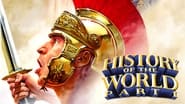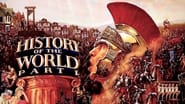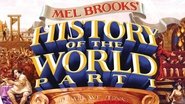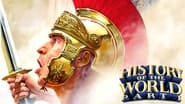YouHeart
I gave it a 7.5 out of 10
Gurlyndrobb
While it doesn't offer any answers, it both thrills and makes you think.
Sarita Rafferty
There are moments that feel comical, some horrific, and some downright inspiring but the tonal shifts hardly matter as the end results come to a film that's perfect for this time.
Skyler
Great movie. Not sure what people expected but I found it highly entertaining.
Michael_Elliott
History of the World: Part I (1981) ** (out of 4)Mel Brooks wrote, directed and plays five different roles in his spoof of various historical events and places. We learn about the Roman Emperor, what was really going on at The Last Supper, the build up to the French revolution and we even get to see the earliest days when apes became men.HISTORY OF THE WORLD: PART 1 turned out to be another hit for Brooks and it's certainly held a good following over the years but to me it was the director's weakest film up to this point. If you look at this movie from a technical point of view then it very well might be the best thing the director ever did. With that said, if you're coming to this picture as a comedy, which I'm sure most people are, then they're bound to be disappointed because there are very few laughs.What keeps the film moving is the fact that it looks terrific. The film had a budget over ten-million dollars, which was a lot at the time and especially for a comedy. There's no question that everything is up there on the screen because the various locations looks terrific. This was especially true for the stuff dealing with the Roman days. Even the spoof on Kubrick's 2001 looked fantastic. You can see why the budget was higher than your typical comedy and the great look of the film is the best thing about it.With that being said, I really didn't think there were too many laughs here. In fact, I really didn't laugh but maybe two or three times early on. One example would be them showing the first marriage with a caveman knocking a cavewoman over the head. Brooks appears throughout the film and does a decent enough of a job but there's just not too much for him to work with. I think the idea of the film was probably a lot better in his mind than it turned out on screen.I will add that Orson Welles and that wonderful voice of his does a fine job with the narration. HISTORY OF THE WORLD: PART 1 just doesn't have enough laughs to make it worthwhile.
brando647
After poking fun at all manner of film genres, Mel Brooks turns his attention to the past with HISTORY OF THE WORLD PART I. I've always considered this one of Brooks' second tier movies, never getting as much love as classics such as SPACEBALLS or BLAZING SADDLES. Watching it again for the first time in more than a decade, it's actually better than I remember. Maybe my tastes have evolved or maybe I just couldn't have cared less about jokes on the French aristocracy as a teenager, but I know I wasn't giving it enough credit. HISTORY OF THE WORLD PART I is a collection of vignettes where Brooks satirizes different eras in human history including the Roman Empire, the Spanish Inquisition, the French Revolution, and more. It brings together most of your favorite Brooks' comedy collaborators (no Gene Wilder, unfortunately) and adds a few new faces to the mix. With narration from Orson Welles, watch as Moses (Brooks) presents the world with the Ten Commandments, experience the excitement of an ancient Roman "stand-up philosopher" (also Brooks) and an Ethiopian slave standing up against the lethargic Emperor Nero (Dom De Luise), and learn why it's "good to be the king" as Brooks pulls double-duty as King Louis XVI and his doppelganger Jacques, the man who holds the urine bucket. It's a lesson in world history from the twisted mind of one of cinema's greatest comedy filmmakers where you're bound to learn something, maybe. Don't. Don't watch this for education purposes.I feel like HISTORY OF THE WORLD PART I is sort of the black sheep of Mel Brooks' filmography. I'd put it in the top tier of his projects but it doesn't get as much vocal love as his classic hits. I hadn't even thought about this movie in years. It had completely fallen off my radar until I bought the Mel Brooks collection. It used to play on cable pretty regularly; I'm pretty sure I'd originally seen it on Comedy Central way back when. Not so much anymore, so this was a fresh start for me. I could remember bits and pieces and a general feeling of indifference toward the movie. I am so glad I got the chance to re-watch it because it's so much funnier than I remember. It's a collection of vignettes so, as with any sort of anthology film, some pieces will be better than others but I'm happy to report that the movie has more highs than lows. The film gets off to a slower start with a segment relating the struggles of early cavemen led by Sid Caesar. It's mostly cheesy slapstick that didn't appeal much to me, with the exception of the creation of the first art critic. After that, the movie is pretty solid. It droops a little again in the final stretch when we're covering the French Revolution because it doesn't appear Brooks could find a whole lot more to skewer than Louis' libido, but even that has memorable moments.The highlights of HISTORY OF THE WORLD PART I are definitely the Roman Empire and the Spanish Inquisition. The Roman segment is my personal favorite and occupies the majority of the film's first hour. It contains some of the best gags and features Madeline Kahn, Dom De Luise, and Gregory Hines as supporting characters. The Spanish Inquisition, on the other hand, is a short segment where Brooks can indulge in his love for musical numbers. I was never keen on the Spanish Inquisition number as a kid but I've taken a shine to it now. It's a fun, Broadway-style extravaganza with synchronized swimmers and medieval torture. What's not to love? On a similar note, I should point out the fantastic production design on this film. This could almost count as Brooks' own parody of classic epic Hollywood films. Each of these segments (except for maybe the Moses bit, which is all set on a small, contained mountain side set) utilizes some impressive design and use of matte paintings that looks like parts out of BEN-HUR or something of that nature. HISTORY OF THE WORLD PART I is a fun watch, even if it never rises to the top of the pile in Brooks' work. I could even see myself re-watching it again more often than BLAZING SADDLES or YOUNG FRANKENSTEIN just because of its variety. I only regret that Brooks never intended on making a PART II because I've been waiting years to see the "Jews in Space" segment teased before the end credits expanded to its full glory.
Mr-Fusion
"History of the World: Part I" is a shocking example of a 90-minute series of gags that land with a dull thud. This is coming from a Mel Brooks fan, which is the reason for the shock. Also, the disappointment. It started out with promise (Brooks and the fift- . . . ten commandments, Bea Arthur in the unemployment office but then the Ancient Rome segment happens and things grind to a halt. And then never pick back up, even after we get out of Rome. It's not every day you see the comedic talents of Dom Deluise squandered (same thing happened with "Smokey and the Bandit II").This was bad.
jzappa
Comic perspective is usually determined in the opening moments of a funny movie, establishing the rules of the new world and hooking the audience. Well, History of the World Part I begins with cavemen waking up and humping air for what feels like a solid 2 minutes. This is his Dawn of Man segment, a vague parody of Kubrick's 2001, before he moves on to The Stone Age during which the first art critic is sent up, and then mocks Moses in an Old Testament sketch, which is essentially a single joke that we fade into and out of that quickly. Where Brooks really goes to town is during The Roman Empire. He stars as a "stand-up philosopher" who, along with a black slave played by Gregory Hines and a defiant vestal virgin, brings pandemonium to the court of the extraordinarily hilarious Emperor Nero, in one of Dom DeLuise's most memorable performances, and Madeleine Kahn, his nymphomaniac empress.We're actually surprised when the movie moves on, because it seems to have decided to develop some semblance of a story there, unlike its preceding episodes. But it does, and Brooks again takes center stage as Torquemada, who celebrates his ecstatic pleasure in torturing Jews who reject Christianity in a Busby Berkeley tableau abounding with melody, singing, and a water ballet. Oh, and a funny little aside elucidates some unanswered questions about how Leonardo Da Vinci painted the Last Supper. Ultimately, Harvey Korman steals the spotlight from Brooks, as per usual, in an absurd caricature of The French Revolution. Korman plays foppish nobleman Count De Monet, who turns up with a cunning plot to save King Louis XVI from death at the hands of the mob by switching the King's lowly doppelganger on the crucial occasion.This is an incoherent, disorderly, sometimes awkward romp by one of the most talented comic filmmakers, who never seems to have a clear idea of the underlying principle of his seventh film escapade, so there's no assertive narrative incentive to bear it along. His historical context doesn't have any method or perspective. It's basically just an assembly line for whatever jokes he can sling on it. What is this off-the-wall grab bag? Is it a lampoon of old Biblical, Roman and French historical epics? From time to time. Is it a never-to-be-repeated, comedy vaudeville seizure? Now and then. Is it a send-up trained at haughty foils? Every so often. But generally it's in essence simply valuable sets standing there expecting Brooks to do something comical before them.Synchronously with Woody Allen, Brooks has helped sustain the comedy genre in contemporary films. As Allen has turned increasingly sophisticated and contemplative, Brooks has gotten increasingly campy and preposterous, the politically incorrect auteur and effortless ham actor's rudimentary oomph let loose flat out with this outrageous 1981 package picture, in which---rather than taking razor-sharp bites out of status quo mythologies and nostalgic legends as he did with his crowning achievements Blazing Saddles and Young Frankenstein---he indulges in our incessant need for mocking the sort of unconsciously class-based theories of manners and good form that inadvertently made burlesque all the rage in its puritan heyday. As in all movies by the ambitious Brooks, there are dull patches where the farce and the gags just don't work. But hit-or-miss is his style, so when he does hit, he hits the bullseye. Or at least somewhere in the red or yellow.







